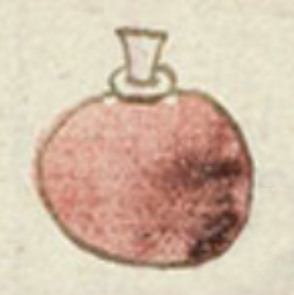aceite (CST41)
This painting of the simplex glyph for the term aceite (oil, a loanword from Spanish, and probably referring to medicinal oil here), shows a very round bottle with a cork in the narrow mouth. Shading on the right side of the bottle gives it a three-dimensionality. This bottle and the three-dimensionality all seem to be European-influenced. The companion text explains that this oil was destined for the hospital, perhaps for massaging patients. The town council purchased one arroba (a Spanish measure of weight that comes from Arabic and might have amounted to 25 libras or pounds) of oil for 5 pesos.
Stephanie Wood
See Kevin Terraciano, Codex Sierra (2021, 125 and 158) for the transcription of the relevant Nahuatl text and the English translation.).
Stephanie Wood
aceyte
aceite
Stephanie Wood
1550–1564
Jeff Haskett-Wood
aceites, hospitales, botellas, corchas

aceite (a loanword from Spanish taken into Nahuatl), oil, https://nahuatl.wired-humanities.org/content/aceite
aceite
Stephanie Wood
Códice Sierra-Texupan, plate 41, page dated 1561. Origin: Santa Catalina Texupan, Mixteca Alta, State of Oaxaca. Kevin Terraciano has published an outstanding study of this manuscript (Codex Sierra, 2021), and in his book he refers to alphabetic and “pictorial” writing, not hieroglyphic writing. We are still counting some of the imagery from this source as hieroglyphic writing, but we are also including examples of “iconography” where the images verge on European style illustrations or scenes showing activities. We have this iconography category so that such images can be fruitfully compared with hieroglyphs. Hieroglyphic writing was evolving as a result of the influence of European illustrations, and even alphabetic writing impacted it.
https://bidilaf.buap.mx/objeto.xql?id=48281&busqueda=Texupan&action=search
The Biblioteca Digital Lafragua of the Biblioteca Histórica José María Lafragua in Puebla, Mexico, publishes this Códice Sierra-Texupan, 1550–1564 (62pp., 30.7 x 21.8 cm.), referring to it as being in the “Public Domain.” This image is published here under a Creative Commons license, asking that you cite the Biblioteca Digital Lafragua and this Visual Lexicon of Aztec Hieroglyphs.


